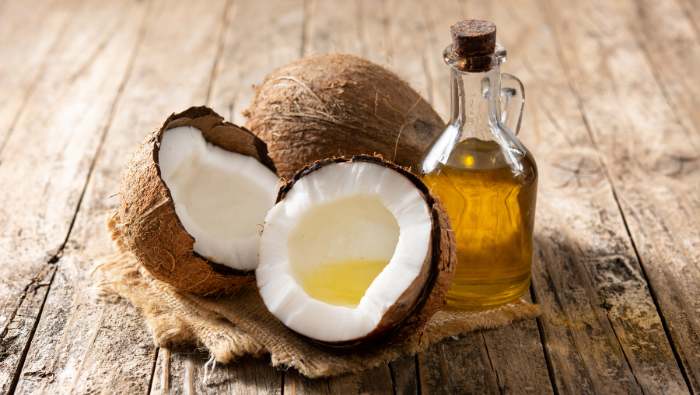How Does Coconut Oil Help The Brain?
Coconut oil has quickly become one of the most popular ingredients in the health and wellness industry.
From skincare to cooking, it seems like coconut oil is everywhere. But did you know that coconut oil can also help with brain health?
Coconut oil has unique properties which make it able to boost cognitive functions and improve overall mental well-being.
It contains medium-chain triglycerides (MCTs) which are metabolized differently than other fats and absorbed into the bloodstream without being stored as fat.
These MCTs provide an energy source that can be used by the body for immediate use, including fueling our brains!
Coconut oil can promote better concentration and alertness, as well as protect against age-related cognitive decline.
How To Use Coconut Oil For Brain Health?
Coconut oil has a variety of benefits for the human body, from skin and hair health to weight loss.
One of these benefits is increased brain function. With its high levels of lauric acid and saturated fat, coconut oil helps improve memory, cognitive function, and mental clarity.
Here are some tips on how you can use coconut oil to improve your brain health.
Consuming coconut oil daily by adding one tablespoon to your morning coffee or smoothie can help increase energy levels and reduce brain fog throughout the day.
You can also use it as a cooking substitute for butter or vegetable oils – this will provide your meals with an extra kick of healthy fats that will nourish your brain cells.
How Much Coconut Oil For Brain Health?
Studies have suggested that coconut oil can help improve memory and cognitive processes, but how much should you consume?
The amount of coconut oil you need depends on several factors such as age, activity level, and overall health.
It is generally recommended to start with one teaspoon per day and increase the dosage if needed.
For individuals looking to maximize any potential benefits of coconut oil on brain health, up to four tablespoons per day is a safe guideline.
However, it’s important to note that these dosages may not be right for everyone so it’s best to consult your doctor before starting any new supplement or dietary regimen.
What Type Of Coconut Oil Is Best For Brain Health?
Coconut oil is a highly versatile and nutritious food that has been used for centuries in many different cultures.
But with so many types of coconut oil on the market, it can be hard to decide which one is best.
When choosing coconut oil for brain health, you want to make sure you’re getting an unrefined version that hasn’t been chemically altered or hydrogenated.
Unrefined virgin or extra virgin coconut oils are usually loaded with vitamins and minerals such as lauric acid and caprylic acid, which can help boost cognitive performance and support overall mental well-being.
Virgin coconut oil is considered to be the highest quality and contains the most nutrients.
It’s a good idea to opt for extra virgin or virgin coconut oil whenever possible, as they have higher amounts of antioxidants and medium chain triglycerides (MCTs).
How Does Coconut Oil Help The Brain?
Scientists are beginning to uncover just how powerful this natural ingredient can be when it comes to improving brain performance.
In recent years, studies have found that coconut oil may help improve memory and focus in both children and adults.
This is due to its high levels of medium-chain triglycerides (MCTs), which are easily digested and provide the body with energy quickly.
Coconut oil’s MCTs also act as an antioxidant in the brain, protecting against damage caused by free radicals and reducing inflammation.
Additionally, coconut oil may improve mental clarity by providing essential fatty acids such as lauric acid, caprylic acid, myristic acid, and capric acid.
Is Coconut Oil Good For Brain Development?
Coconut oil has recently been touted as a miracle oil, with some even claiming it can improve brain development.
But what is the real truth behind this claim?
Recent research has shown that coconut oil may indeed have a positive impact on cognitive development and can help to improve mental clarity and focus.
Studies suggest that consuming coconut oil increases ketone bodies in the blood, which provide an alternate energy source for the brain.
This alternative energy source helps to fuel neuronal activity, resulting in improved memory and concentration.
Additionally, coconut oil contains several fatty acids which are essential for the proper growth and functioning of neurons, including Omega-3 fatty acids DHA and EPA.
These fatty acids boost the production of important neurotransmitters in the brain, reducing the risk of anxiety and depression.
How Much Coconut Oil Daily For Brain Health?
When it comes to optimizing brain health, one of the most important steps is finding the right diet.
One often overlooked element of a healthy diet is coconut oil.
Coconut oil can provide many benefits for brain health, and it’s essential to find out how much you should be consuming daily for optimal benefits.
Studies have found that consuming two tablespoons of virgin coconut oil each day may help boost cognitive function by providing essential fatty acids and increasing energy production.
This type of fat helps reduce inflammation in the brain which is linked to mental illnesses such as depression and Alzheimer’s disease.
Additionally, the high levels of lauric acid in coconut oil are believed to protect against toxins and viruses that can damage the brain cells while helping improve clarity and focus.
Coconut oil contains compounds such as lauric acid and medium-chain triglycerides that can improve memory and reduce inflammation in the body.
The fats found in coconut oil are easily absorbed by the body, providing an efficient source of fuel for your cells and helping to protect your brain from damage caused by free radicals.
Studies have also shown that consuming coconut oil regularly may help with conditions like Alzheimer’s disease, depression, anxiety, and stress.
Coconut oil is also great for weight loss. It’s high in healthy fats and promotes the use of stored fat as fuel, which helps with weight loss.
It can help you burn more calories, especially when eaten in conjunction with exercise.
Incorporating coconut oil into your diet can be a simple yet effective way to reap its benefits.
What Type Of Coconut Oil Is Best For The Brain?
Virgin coconut oil is unrefined and contains antioxidants and medium-chain triglycerides (MCTs).
MCTs have been known to provide a wealth of positive effects on the body including increased energy levels and improved cognitive function.
Additionally, virgin coconut oil has anti-inflammatory properties which can enhance mental clarity by reducing inflammation in the brain.
Organic extra-virgin coconut oil is also beneficial for brain health because it contains lauric acid, an essential fatty acid that helps protect against viruses and bacteria while boosting cognitive performance.
Virgin Coconut Oil vs Extra Virgin Coconut Oil
Virgin Coconut Oil and Extra Virgin Coconut Oil are two different types of coconut oil that have been gaining popularity in recent years due to their health benefits, but what is the difference between them?
Virgin Coconut Oil, sometimes called simply coconut oil, is made from dried or fresh coconut flesh. It has the light taste and smell of coconuts and is widely used for cooking.
The oil can be used as a topical moisturizer because it helps keep the skin hydrated while providing antibacterial properties.
Extra Virgin Coconut Oil is made from pressing raw or non-heated coconut flesh, which gives it its signature coconut taste and aroma.
This type of oil contains more antioxidants than virgin coconut oil as well as lauric acid that helps support healthy immune system function.
Is Coconut Oil Good For Mental Health?
Coconut oil is one of the healthiest cooking oils around, but did you know it also can help support your mental health?
Coconut oil is known for its antibacterial and anti-inflammatory properties and has been shown to be beneficial in supporting healthy brain function.
Research indicates that coconut oil is rich in medium-chain triglycerides (MCTs) which have been found to improve cognitive functioning by providing an alternate energy source for the brain cells.
This means that consuming coconut oil helps keep the brain running smoothly, improving mood, focus, and concentration.
Additionally, MCTs are essential for producing ketones which can reduce stress levels and protect against anxiety.
Studies suggest that eating foods high in MCTs such as coconut oil may even help reduce symptoms of depression.
Is Coconut Oil Good For Anxiety?
Recent research suggests that coconut oil may also have the potential to reduce anxiety levels.
Recent studies suggest that consuming coconut oil has the potential to help alleviate symptoms of anxiety by providing essential fatty acids that are required for proper brain function.
Coconut oil contains lauric acid, which has been linked to improved moods and reduced levels of stress hormones like cortisol, both important factors in reducing anxious thoughts and feelings.
Additionally, its anti-inflammatory properties may help reduce inflammation-related stress responses in the body which can contribute to higher levels of anxiousness or panic attacks.
How To Use Coconut Oil For Anxiety?
Recent studies suggest that coconut oil may also be beneficial in relieving symptoms of anxiety.
Using coconut oil for anxiety is an affordable and easy way to help manage stress and improve your mental health.
Coconut oil has been used as a traditional home remedy across many cultures for centuries.
It contains lauric acid, which helps boost metabolism and reduce inflammation throughout the body.
Recent studies have found that consuming coconut oil can also help relieve symptoms of anxiety by improving mood, reducing fatigue, and calming the mind.
Coconut Oil For Depression
Coconut oil has long been known for its numerous health benefits, and now some believe it could be used to treat depression.
Recent studies have shown that the fatty acids contained in coconut oil may help to reduce symptoms of depression.
The natural oil is derived from the meat of mature coconuts and is made up of primarily saturated fats, including lauric acid, caprylic acid, and capric acid.
These fatty acids can all contribute to improving mental health conditions like depression.
Lauric acid helps improve mood by increasing serotonin levels in the brain while both lauric and caprylic acids are believed to break down fats which can heighten energy levels.
Coconut oil also contains a number of other vitamins and minerals that can have a positive effect on mental health such as vitamin E, vitamin K1, iron, magnesium, and potassium.
A cup of coconut oil can be used as a substitute for butter or other oils in a number of recipes, but it is also an excellent source of energy by itself.
Coconut oil can be added to coffee, tea, smoothies, and even baked goods instead of using refined sugar.
Is Coconut Oil An Antidepressant?
Recent studies suggest that coconut oil may have some antidepressant properties.
Derived from the meat of coconuts, coconut oil is rich in lauric acid and saturated fats.
Research suggests that these fatty acids act on receptors in the brain, leading to an increase in serotonin levels which can improve mood and reduce stress levels.
This means that consuming coconut oil may provide some relief from the symptoms of depression like fatigue, loss of interest, and insomnia.
Additionally, its anti-inflammatory properties may make it beneficial for those with underlying medical conditions related to depression such as diabetes or arthritis.
Coconut Oil For Memory Loss Mayo Clinic
While research is still in the early stages, some studies show that coconut oil may improve cognitive function and help with memory-related diseases like Alzheimer’s.
The Mayo Clinic takes a closer look at how coconut oil may benefit those suffering from memory loss.
According to research conducted by the Mayo Clinic, coconut oil contains medium-chain triglycerides (MCTs), which act as an energy source for the brain.
Some studies suggest that consuming MCTs can help increase energy levels in the brain, improving focus and alertness.
Additionally, MCTs have anti-inflammatory properties which can reduce inflammation in the body—an important factor in preventing age-related diseases such as Alzheimer’s and dementia.
You may also enjoy…
What Is Rejection Sensitivity?
Is Apple Cider Vinegar Good For Mental Health?








